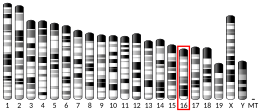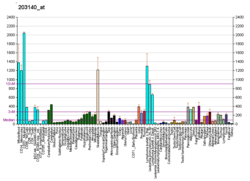Bcl-6 (B-cell lymphoma 6) is a protein that in humans is encoded by the BCL6 gene. BCL6 is a master transcription factor for regulation of T follicular helper cells (TFH cells) proliferation.[5] BCL6 has three evolutionary conserved structural domains.[6] The interaction of these domains with corepressors allows for germinal center development and leads to B cell proliferation.
The deletion of BCL6 is known to lead to failure of germinal center formation in the follicles of the lymph nodes, preventing B cells from undergoing somatic hypermutation.[6] Mutations in BCL6 can lead to B cell lymphomas because it promotes unchecked B cell growth.[6] Clinically, BCL6 can be used to diagnose B cell lymphomas and is shown to be upregulated in a number of cancers.[6]
Other BCL genes, including BCL2, BCL3, BCL5, BCL7A, BCL9, and BCL10, also have clinical significance in lymphoma.
- ^ a b c GRCh38: Ensembl release 89: ENSG00000113916 – Ensembl, May 2017
- ^ a b c GRCm38: Ensembl release 89: ENSMUSG00000022508 – Ensembl, May 2017
- ^ "Human PubMed Reference:". National Center for Biotechnology Information, U.S. National Library of Medicine.
- ^ "Mouse PubMed Reference:". National Center for Biotechnology Information, U.S. National Library of Medicine.
- ^ Owen JA, Punt J, Stranford SA, Jones PP, Kuby J (2013). Kuby immunology. W.H. Freeman. ISBN 978-1-4292-1919-8. OCLC 820117219.
- ^ a b c d Yang H, Green MR (2019-11-07). "Epigenetic Programing of B-Cell Lymphoma by BCL6 and Its Genetic Deregulation". Frontiers in Cell and Developmental Biology. 7: 272. doi:10.3389/fcell.2019.00272. PMC 6853842. PMID 31788471.






